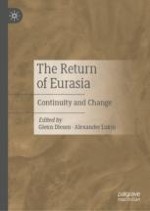2021 | OriginalPaper | Chapter
3. Asia Before Eurasianism: The Pre-Revolutionary Roots of a Russian Emigré Ideology
Author : David Schimmelpenninck van der Oye
Published in: The Return of Eurasia
Publisher: Springer Singapore
Activate our intelligent search to find suitable subject content or patents.
Select sections of text to find matching patents with Artificial Intelligence. powered by
Select sections of text to find additional relevant content using AI-assisted search. powered by
